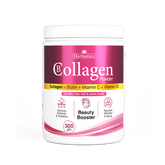Are Daily Multivitamins & Supplements Safe for Everyone?
Today's consumers have high expectations for their health and well-being, which has led to a boom in the market for dietary supplements, such as daily multivitamins for men and multivitamins for women. Among the multitude of choices, concerns surface about their efficacy and safety, especially with regard to multivitamins designed with a particular gender in mind. With a focus on both men and women, this thorough investigation seeks to examine the safety concerns related to daily multivitamin usage.

Understanding Multivitamins
Dietary supplements, known as multivitamins, are made to supply a wide range of vital vitamins and minerals, frequently in conjunction with additional nutrients. Although their purpose is to enhance one's diet, there is ongoing discussion regarding their safety and usefulness. The purpose of multivitamin supplements is to fill up any possible nutritional gaps and guarantee that the body gets enough of the vital elements required for different body processes.
Multivitamins for Men
Generally speaking, men's multivitamins contain nutrients that are thought to support health needs unique to men. Higher dosages of vitamins, such as B vitamins and vitamin D, and minerals, such as zinc and selenium, which are supposedly good for prostate health, testosterone production, and general energy levels, are frequently included as key ingredients. But further research is needed to determine how safe these formulations are, especially in light of any possible negative consequences from consuming too many nutrients.
Safety Considerations for Multivitamins for Men
Although supplementing with specific nutrients may be beneficial for many men, using multivitamins carelessly can have negative effects. Overconsumption of some vitamins and minerals, like calcium, iron, and vitamin A, can have negative consequences for health. It's also necessary to take into account drug interactions and pre-existing medical issues, which emphasises the significance of speaking with medical professionals before beginning any supplementing routine.
Additionally, there are big differences in men's multivitamins' ingredient quality and sourcing. Other safety concerns include contaminants, inaccurate labelling, and insufficient regulation. Therefore, in order to reduce any possible concerns related to men's multivitamin use, it is imperative to choose recognised products with transparent manufacturing procedures.
Multivitamins for Women
Women's multivitamins are designed to meet the unique nutritional needs of women, such as the increased demand for particular vitamins and minerals during menopause, pregnancy, and lactation. Elevated levels of iron, calcium, folic acid, and vitamin B12—all essential for bone density, reproductive health, and general well-being—are frequently identified as key components. But even with their carefully thought-out compositions, safety concerns still exist.
Safety Considerations for Multivitamins for Women
Overconsumption of some minerals, such as iron and vitamin A, can be dangerous for women, especially those who are fertile and may result in birth abnormalities or other health problems. Furthermore, the interaction between hormonal contraceptives and multivitamin elements highlights the need for medical care in order to prevent side effects or decreased effectiveness of contraception.
In addition, the safety of women's multivitamins is greatly dependent on their quality and purity. Contaminants like heavy metals and incorrectly labeled products can endanger consumer health, which emphasizes the need for informed decision-making and regulatory oversight.Customised supplementation strategies suggested by licenced dietitians or medical professionals can improve safety and efficacy.
General Safety Considerations
When using daily multivitamins and supplements, there are a few general safety precautions that go beyond gender-specific formulations:
1. Nutrient Interactions
Some vitamins and minerals may interact negatively or modify the effectiveness of prescription drugs or other supplements. It can be helpful to recognise and reduce these interactions by consulting healthcare specialists.
2. Nutrient Excess
Excessive intake of vitamins and minerals, especially fat-soluble vitamins (A, D, E, and K), can cause toxic effects. For general safety, heeding dosage recommendations and avoiding over-supplementation are crucial.
3. Quality and Regulation
Compared to the pharmaceutical industry, the dietary supplement sector is less strictly regulated, which raises the possibility of subpar goods. Selecting supplements that have undergone independent testing and certification can improve their safety and effectiveness.
4. Individual Variability
Age, sex, heredity, and state of health are some of the variables that affect an individual's nutritional demands. Customized supplementing strategies suggested by licensed dietitians or medical professionals can improve safety and efficacy.
10 Reasons Why Men and Women Should Consider Daily Supplementation
1. Nutritional Insurance
With multivitamins, one can easily make up for any nutritional gaps in their diet and ensure that they are getting enough of the important vitamins and minerals that they might not be getting from their diet alone.
2. Busy Lifestyles
It might be difficult to maintain a balanced diet in the fast-paced world of today. Multivitamins are a practical answer for people with busy schedules who might find it difficult to regularly eat meals high in nutrients.
3. Promote General Health
Vital vitamins and minerals are important for many body processes, such as immune system response, metabolism, and tissue healing. Multivitamins offer comprehensive support for overall health and wellbeing.
4. Enhanced Energy
The metabolism of energy depends on B vitamins, especially B12 and folate. Taking a multivitamin supplement that contains these minerals can help people who have demanding physical activity or hectic lifestyles avoid weariness and feel more energised.
5. Heart Health
By lowering oxidative stress and fostering appropriate blood pressure regulation, antioxidants like vitamins C and E, as well as minerals like magnesium and potassium, are found in some multivitamins.energised.
6. Bone Health
To keep strong and healthy bones, you need to consume calcium, vitamin D, and vitamin K. Since women are more prone to bone-related problems, multivitamins enriched with these minerals can help lower the risk of osteoporosis and support bone density.
7. Immune Support
Zinc and selenium, along with vitamins A, C, D, and E, are essential for immune system health. These minerals are found in multivitamins, which may help boost immunity and lower the risk of infection, particularly when under stress or unwell.
8. Skin, Hair, and Nail Health
Vitamin C, zinc, and biotin are a few of the vitamins and minerals that help maintain healthy skin, hair, and nails. These nutrients can be found in multivitamins, which can help to support healthy skin, thick hair, and strong nails.
9. Reproductive Health
To prevent neural tube problems in babies, women of reproductive age must consume an adequate amount of folic acid. Folic acid-containing multivitamins boost foetal development and reproductive health in conjunction with other prenatal nutrients like calcium and iron.
10. Age-Related Support
As people age, their dietary needs may alter as a result of things like higher dietary requirements and lower absorption. Age- or life-specific multivitamins can assist in addressing these shifting nutritional requirements and promote good ageing.
While there are many potential advantages to multivitamins, it's important to select high-quality products, adhere to dosage recommendations, and seek the counsel of healthcare professionals for specific recommendations, particularly for those with dietary restrictions or certain health issues.
Final Verdict
Supplements and daily multivitamins, including men's and women's particular formulations, may help fill in nutritional deficiencies and promote general health. However, a number of variables, such as appropriate dosage, quality control, and personalised considerations, affect their safety. Even though many people might benefit from supplements, making educated decisions and seeking medical advice before taking multivitamins for men and multivitamins for women are crucial to guarantee safety and improve health outcomes.




